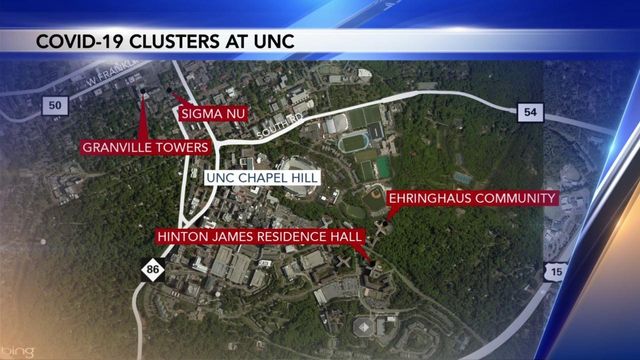Fourth cluster of coronavirus reported in UNC student housing
On Sunday, the university identified a cluster of COVID-19 cases in the Hinton James residence hall. On Saturday, they reported a cluster in Sigma Nu fraternity. Earlier in the week, UNC reported clusters at Ehringhaus and Granville Towers.
Posted — UpdatedThe Centers for Disease Control and Prevention defines a cluster as groupings of a particular disease that appear in an unusual frequency in one place.
The newest cluster was reported in the Hinton James residence hall on Sunday.
Mimi Chapman, chair of UNC-Chapel Hill's faculty, is calling a special meeting on Monday at 4 p.m. with the Faculty Executive Committee to discuss the rise in coronavirus cases.
The committee is asking for the Board of Governors to give the chancellor more power in making decisions about a possible move to online classes.
The chancellor and provost "may" attend Monday's meeting, which will be held remotely.
At least one professor has canceled in-person classes due to the rise in coronavirus cases on campus.
Some students voice concerns over virus, while others appear dismissive
University leaders said the challenge is effectively communicating to students to stop holding large gatherings and take precautions against the virus.
Officials recognize that college is usually a time of socializing and exploration – a tradition and life experience that's being dampened by the pandemic for young adults during this time.
"I feel for this generation, as they are going through this experience that a lot of us would equate to having a lot of social experiences with friends and getting to see people," said Dr. Amir Barzin of UNC Hospitals.
Dr. Barzin said getting the college-age demographic to take precautions against the pandemic will be tricky.
"It’s putting it out there, just as many times as we can, as a healthcare community, as a university community, we’re talking about the importance of distancing, wearing masks, washing hands. but anytime we get the opportunity to make it personal and why we’re mentioning it helps as well," he said.
Some students and members of the Chapel Hill community have taken to social media to share their anxiety over the multiple cases of COVID-19 that have come out at UNC in the past several months.
Because many colleges are reopening, Johns Hopkins Public Health released guidelines on how students and college campuses should prepare for college.
"Schools should have policies in place — and clearly communicate them to students, parents, faculty, and staff — but there are still things individuals can do to limit the risk of COVID-19 transmission," the guidance says.
Johns Hopkins also released a graphic to go along with this guidance. The graphic has a message to students holding fraternity parties: don't.
UNC officials suggest that anyone experiencing symptoms should call their medical provider or Campus Health at (919-966-2281).
The University said they will not broadly communicate details about individual positive cases, consistent with the State Human Resources Act and the Family Educational Rights and Privacy Act, as well as other privacy considerations, but will continue to monitor on-campus behavior such as masks, social distancing and gatherings.
Related Topics
• Credits
Copyright 2024 by Capitol Broadcasting Company. All rights reserved. This material may not be published, broadcast, rewritten or redistributed.






